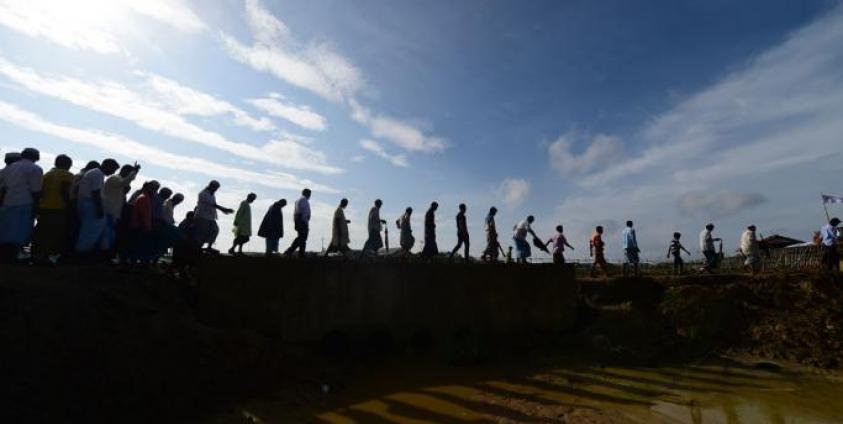Rohingya refugees arrive to attend a ceremony organised to remember the second anniversary of a military crackdown that prompted a massive exodus of people from Myanmar to Bangladesh, at the Kutupalong refugee camp in Ukhia on August 25, 2019. Photo: Munir Uz Zaman/AFP
United Nations Secretary-General Antonio Guterres should act to prevent future UN failures in the face of atrocities, a coalition of 16 organizations said in a joint letter to the secretary-general just released.
The May 2019 report of an independent investigation by a Guatemalan diplomat, Gert Rosenthal, raised serious concerns about the UN’s handling of the human rights crisis in Myanmar. The secretary-general should promptly carry out reforms to prevent what the report called the recurrence of the “systematic” failures and “obvious dysfunctional performance” and to ensure individual accountability for those failures, according to the statement.
“The UN leadership promised it would never again turn a blind eye to atrocities after ignoring massive civilian deaths in Sri Lanka a decade ago, but it happened again,” said Louis Charbonneau, UN director at Human Rights Watch. “The UN leadership needs to avoid another catastrophe, including by holding officials who failed to act during Myanmar’s ethnic cleaning campaign accountable.”
The secretary-general’s decision to commission an investigation, and to release and accept all the recommendations in the Rosenthal report, was a valuable first step, the groups said. However, the UN made similar commitments after the 2012 internal review panel report on UN action in Sri Lanka, written by Charles Petrie. The Rosenthal report shows that the failure to fully carry out the Petrie report recommendations set the stage for the UN’s subsequent failings in Myanmar.
The Rosenthal report describes the UN’s failure to stop, mitigate, or even draw attention to violence by Myanmar security forces against ethnic Rohingya. The UN Independent International Fact-Finding Mission found that the security forces’ actions amounted to crimes against humanity and warranted an investigation of the crime of genocide.
The groups said that the limited scope of the Rosenthal inquiry – undertaken by one individual without field visits – meant that it did not satisfy the UN Human Rights Council’s call for a “comprehensive” investigation in Myanmar. The inquiry’s scope was also not reconcilable with the extraordinary magnitude of the crisis and the urgency of gathering “lessons learned” to improve future UN responses to human rights emergencies.
Secretary-General Guterres should recommit to and revitalize the human rights reforms initiated by his predecessor in response to the Petrie report, the groups said. Those reforms, known as Human Rights up Front, were aimed at ensuring that human rights become a priority for all UN officials – from junior to senior – and in UN operations at headquarters and field missions around the world. The current UN administration has overseen a comprehensive dismantling of those reforms.
“It’s sad to see another ‘lessons-learned’ report after all the promises of ‘never again’ that followed the Petrie report,” Charbonneau said. “The UN leadership has taken an important step to learn from its failures in Myanmar, and the secretary-general should now make good on those promises.”
The following groups signed the letter to Secretary-General Guterres:
ALTSEAN-Burma
Amnesty International
Article 19
ASEAN Parliamentarians for Human Rights (APHR)
Asian Forum for Human Rights and Development (FORUM-ASIA)
Burma Campaign UK
Burma Human Rights Network
Fortify Rights
Global Justice Center
Human Rights Watch
International Campaign for the Rohingya
International Commission of Jurists
International Federation for Human Rights (FIDH)
Jacob Blaustein Institute for the Advancement of Human Rights (JBI)
Justice for All/Burma Task Force
Progressive Voice








